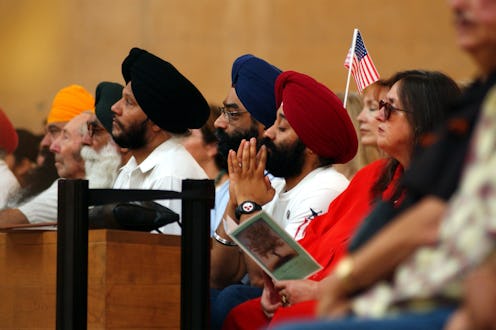
Police are investigating a possible hate crime concerning a 39-year-old Sikh man who was shot in his driveway in Kent, Washington, after a man allegedly told him to "get out of our country." The victim was working on his vehicle in his driveway when a gunman confronted him around 8 p.m., according to Kent Police Chief Ken Thomas at a press conference on Saturday.
"Some comments were made to the effect of 'get out of our country, go back to where you're from,' and our victim was then shot," Thomas told reporters. The gunman was described as a medium-built white man around 6 feet tall. The victim reportedly told police that he had never seen the assailant before. "This is the first incident [in Kent] of this magnitude that I'm aware of," Thomas said, according to CNN. "To think that this could happen in our community was very surprising and extremely disappointing."
The Sikh man, who was shot in the arm, has been released from the hospital, according to The Seattle Times, and the FBI has been contacted, the chief said.
Washington Sen. Maria Cantwell tweeted about the incident: "Thoughts and prayers go out to the #Sikh man shot in Kent. I stand with the Sikh community and condemn these acts."
Since 9/11, Sikh men, who wear the traditional turban as an article of their faith, have been mistaken for Muslims. Incidents of alleged bigotry and suspicion have been reported against Sikh men and women. And although Sikhs have been in the United States for over a century, arriving here to work on the railroads in the West, they are still seen and treated as outsiders.
Given the visual proximity Sikh men often share with Muslim men, they are frequently mistaken to be Muslims, who have also been attacked in religiously-and racially-motivated crimes. The specter of the turban-wearing man from the Middle East is an Islamophobic motif among those who harbor hatred for Muslims but can't tell a Sikh and Muslim apart. Due to this confusion of mistaken identity, Sikh and Muslim activists have come together to tackle Islamophobia, racial profiling, societal hatred after 9/11.
According to the Sikh Coalition, multiple reports of discrimination and violence against Sikh Americans gained prominence after 9/11. From school bullying to religious profiling, the Sikh community in the United States has witnessed varying degrees of xenophobic and anti-immigrant sentiment.
In August 2012, a gurdwara (Sikh temple) in Oak Creek, Wisconsin, became a target of white supremacist Wade Michael Page's attack. Six Sikh victims were killed. Page killed himself after being wounded by a responding police officer, according to the FBI.
Americans frequently mistake the panentheistic faith of Sikhism to be an offshoot of Hinduism or Islam; however, the faith is an independent religion, with more than 28 million adherents worldwide.
As anti-immigrant animus takes control of the American political landscape with an aggressive crackdown on immigration, activists and scholars are urging people to open their minds toward religions and cultures they know little about. Professor Simran Jeet Singh, an assistant religion professor at San Antonio's Trinity University, tweeted an educational list of things you may not know about Sikhs.
According to the list, Sikhism presents a "pluralistic worldview" where followers are taught to work for society through community service. Sikh Gurus, according to Singh, do not advocate for religious exclusivism. It is because of this pluralistic worldview, in Singh's words, Sikhism remains one of the rare organized religions with "no real history of missionizing or proselytizing."
The list also highlights the social justice endeavors of Guru Nanak, the founder of Sikhism, who openly criticized chasm and hierarchy in society and called for the empowerment of the marginalized. In our politically chaotic times, Guru Nanak's teachings remain relevant, if not critical, to learn from and apply in our daily lives.
While there have been no definitive statements about the assailant's motives, it is clear that anti-immigrant sentiment in the United States has gained momentum under an administration that has aggressively amplified crackdowns on immigrants. During a meeting with business officials in February, Donald Trump called his plan on immigrants a "military operation" to get the "really bad dudes" out of the United States.
In a political landscape like ours where there is a tradition of anti-Muslim and anti-Sikh attitude, such loaded language from political figures, let alone the president of the United States of America, emboldens craven outbursts of xenophobia and anti-immigrant animus. Language truly does matter.
In a statement, Sikh Coalition Interim Program Manager Rajdeep Singh said:
While we appreciate the efforts of state and local officials to respond to attacks like this, we need our national leaders to make hate crime prevention a top priority. Tone matters in our political discourse, because this a matter of life or death for millions of Americans who are worried about losing loved ones to hate.